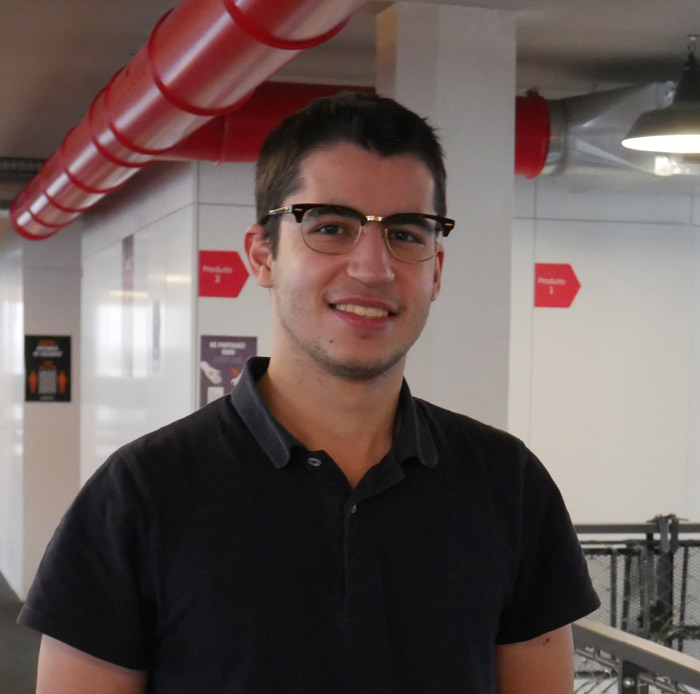Meet Kosmosnautes #20: Maxime, Technical Expert
Maxime tells us about his daily life and his projects since joining Kosmos.

- Hello Maxime, what's your background?
After my baccalaureate, I began my engineering studies at Polytech Nancy, with 2 years of preparatory studies. After two years, I wanted to discover new horizons. I had a choice of different schools in France and chose Nantes. I spent 3 years at Carquefou, where I completed my final year in Course alternation. I then spent a year working for a start-up that produces training software for companies. I had a very versatile role, but unfortunately after a few months, the founder decided to change his mind and wind up his business to return to salaried employment. I went back to work as an integrator for a large group in the Region, but I didn't really like the organization. Finally, Pandora contacted me to join Kosmos!
- Qu't'est-ce qui t'made you want to'to join Kosmos?
What's interesting about Kosmos, and what everyone shares, is that our mission is meaningful. We work in education, we know our Users, and that's what has made the difference compared to companies like ESN where you can't see the purpose or meaning of the missions. I also appreciate the fact that this is a small company with a very simple organization, and that the hierarchy is very accessible.
- What's your career path at Kosmos (if you've changed jobs)?
I've been with Kosmos for almost 2 years now. I started out in operations. My responsibilities have evolved, in particular with regard to a safety project, for which I work independently and in liaison with NFrance. It's a great project that will involve the whole group.
- In concrete terms, what is your day-to-day life like, and how would you explain your job?
I work in the operations team, and our job is operational: we're responsible for keeping the servers and software developed by Kosmos running smoothly.
At Kosmos, we have an interesting point of view on how to do our job: we consider that our servers/infrastructures should be managed like software, which is why some of our tools are also used by developers.
My team's job is to deliver the most robust infrastructures possible, using measurement systems, documenting our actions and automating as many tasks as possible to limit human error.
The other facet of our job is to work with development teams, providing them with tools to make installing and updating their software simple, fast and reliable.
In practical terms, my day-to-day work is that of a Site Reliability Engineer (SRE). It's an application of DevOps principles specific to the operations business. It's a job that requires a lot of curiosity and open-mindedness, rather than academic knowledge. Technical expertise and rigor remain paramount.
-
What do you love about your job?
I like the richness and diversity of the missions. We have to be able to do very technical things and at the same time know how to communicate. I like looking for solutions and testing tools. I also like the autonomy. We don't wait for orders to come from the top, to meet developers' expectations. The circuit is short and fast, so you see the results of your work straight away. We spend our time adding value and putting things in place. We have no constraints apart from time. We have a great deal of freedom in our business. Our organization has a strong technical culture, which enables us to move forward and see our projects through to completion.
My projects are quite varied, ranging from security to analytics. My missions alternate between development, infrastructure and fault analysis. What I really like about this job is looking for the little needle in the haystack, spending time finding the cause of the problem. What I also like is the path to finding the solution to the problem.
-
What qualities do you think are needed for this job?
For me, the level of study doesn't really matter, what you need is to be open-minded, curious, eager to learn and not necessarily a perfectionist, but always striving to improve. That would even be the team's slogan: "strive to improve".
- An achievement/project that made you proud?
When I arrived, I was immediately put on Skolengo Analytics, which was an ambitious project. I had to learn the architecture, communicate with the team in Canada who were managing the project. I learned a lot and it made me proud. When I think of my arrival at Kosmos, I think directly of this project. The quality of my work was recognized not only by the Canadian team, but also by management.
-
How have you progressed since joining Kosmos?
Over time, I've become more rigorous and I've gained in Skills on the analysis side.
- If you hadn't done this job, what would you have done?
Honestly, I think that if I had to do it all over again, I would have taken the same route. The job I do today gives me a certain independence. I have no constraints, I can invest myself outside my work and I don't see things any other way.
- What are your key references (website / book / person) in your field?
There's the medium site, a technical site with articles that have a simple introduction. This site can help us come up with ideas and solutions, and the content is quite varied. I'm also thinking of the CNCF Foundation, which is an open source foundation that brings together a lot of IT projects in infrastructure or software. There's also the KUBECON event, where we talk a lot about infrastructure.
-
What do you like about Kosmos?
On the whole, the atmosphere, because we're a small company, is very close, we all know each other, and I really like the fact that there's no hierarchy. And then there's the fact of being autonomous and having control over your projects and what you do.
- What's it like to work for the education sector?
I'm thinking above all of our customers' requirements. The specifications are demanding and strict. We really have to take this into consideration.

En savoir plus sur les offres d'emploi Kosmos

